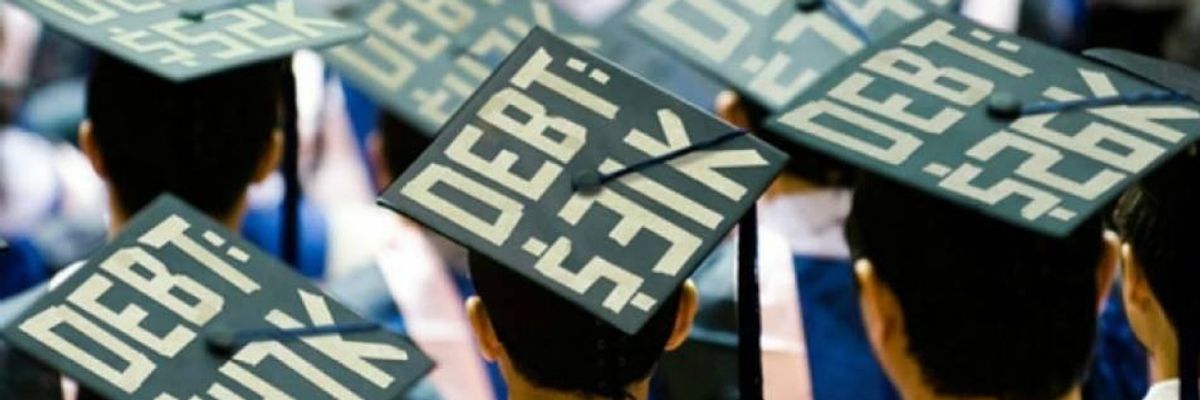This week, Public Citizen urged congressional leaders to take bolder action in the next stimulus package by canceling a portion of every student's federal student debt. This action will be needed to help jumpstart the economy at what could be a long economic downturn.
Forty-five million Americans hold a whopping $1.6 trillion in student loan debt. Eight million of those individuals have defaulted on their loans. Sadly, a person defaults on their student loans every 26 seconds. Even before the coronavirus crisis upended our economy and sent millions all at once into unemployment, student loan debt threatened the economic security of every borrower.
With the increasingly grim predictions about the economy, this crisis is about to get a lot worse unless Congress acts. One way that Congress can help the economy is to grant student debt borrowers even more relief in the months to come.
This month, Congress passed the CARES Act, which will grant temporary relief to workers, consumers, small and large businesses, and many student borrowers. However, the CARES Act does not do enough to address the looming economic crisis that student borrowers face. First, while the law grants a six-month suspension on federally-held federal student loans, it excludes an estimated one in five borrowers who owe commercially-held FFEL loans or Perkins loans (which are directly paid back to a college or university).
Second, even for the eighty percent of borrowers who benefit from a six-month suspension, many will face the daunting prospect starting in October of choosing between paying for necessities including food, medical care, and rent, or making their student loan payment. With the increasingly grim predictions about the economy, this crisis is about to get a lot worse unless Congress acts. One way that Congress can help the economy is to grant student debt borrowers even more relief in the months to come.
This week, we urged Congress to cancel a portion of student loan debt for all borrowers. We also urged congressional leaders to extend the suspension of federal student loan payments that was passed in the CARES Act law through at least March 2021, so those who will continue to have payments will have more breathing room to get back on their feet. In parallel, U.S Rep.s Ayanna Pressley and Ilhan Omar introduced a bill to cancel a minimum of $30,000 in federal student loans that a person holds. Public Citizen supports this important bill. And the presumptive Democratic nominee Joe Biden announced a policy to forgive all tuition-related undergraduate federal debt from public colleges and universities for anyone making less than $125,000, which is in addition to his previous plan to immediately cancel a minimum of $10,000 of student debt per person and require a borrower to pay no more than five percent of discretionary income for those making more than $25,000. (Those making less than $25,000 would not have to make monthly payments and would not accrue interest.)
The burden of student loan debt falls greatest on people of color, who borrow at higher rates and in larger amounts due to racial inequities in incomes and wealth. Additionally, women hold two-thirds of the country's student debt and on average borrow $3,000 more than men to attend college--yet because of the wealth and wage gaps, women find it harder to repay their loans. And three million Americans over the age of 60 still have student debt. More than 40,000 people over 65 have their Social Security payments, tax refunds, or other government payments offset or garnished because they have fallen behind on their student loan payments.
According to a Consumer Financial Protection Bureau (CFPB) Snapshot report, older borrowers are more likely than those without outstanding student loans to report that they have skipped necessary health care needs such as prescription medicines, doctors' visits, and dental care because they could not afford it.
Opponents of student debt cancelation argue that it would be a windfall for the most privileged like doctors and lawyers who, like me, hold a lot of student debt. But the data show the exact opposite. Those with the least debt are more likely to default on their loans, for example, those who drop out of school before finishing their degree, but are still on the hook paying back their loans. Therefore, canceling even $10,000 of student loan debt--which makes up almost two-thirds of those who default--would be incredibly impactful for those struggling to make ends meet.
Now more than ever, we must ensure that all people prioritize their health and economic wellbeing and that of their families and neighbors. Federal student debt cancelation is an essential factor in making that possible. It will also stimulate the economy by allowing millions to put the money they otherwise would use to pay off their student loans into buying a new car, injecting much needed cash into local businesses, and making the out-of-reach dream of buying a home seem possible.
It's clear that we are entering a worldwide contraction that will be as bad, or worse, than the 2008 financial crisis. By the time you read this blog, about seven people defaulted on their student loans. But there's hope. Congress can take strong, bold action. It's time to cancel student loan debt and provide meaningful relief to people and strong economic stimulus that will benefit all.
You can find the letter here. And a recent explainer on how the CARES Act impacts student loan borrowers here.

